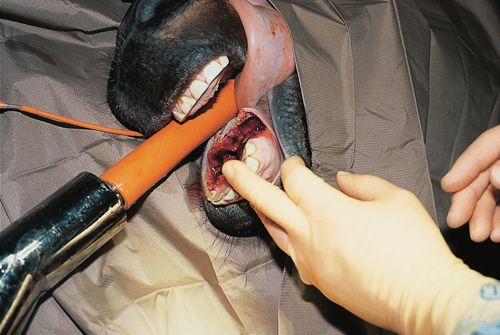Difference between revisions of "Equine Orthopaedics and Rheumatology Q&A 03"
Jump to navigation
Jump to search
Ggaitskell (talk | contribs) |
Ggaitskell (talk | contribs) |
||
| Line 23: | Line 23: | ||
|l4= | |l4= | ||
</FlashCard> | </FlashCard> | ||
| + | |||
| + | |||
| + | {{#tag:imagemap|Image:Next Question.png{{!}}center{{!}}200px | ||
| + | rect 0 0 860 850 [[Equine Orthopaedics and Rheumatology Q&A 04|Next question]] | ||
| + | desc none}} | ||
| + | [[Category:Equine Orthopaedics and Rheumatology Q&A]] | ||
Revision as of 17:24, 24 May 2011
| This question was provided by Manson Publishing as part of the OVAL Project. See more Equine Orthopaedic and Rheumatological questions |
A two-year-old Thoroughbred colt was off its food as a result of the problem illustrated in the image.
| Question | Answer | Article | |
| What is your diagnosis? | An open fracture of the rostral mandible caudal to the incisor teeth.
|
[[|Link to Article]] | |
| How does this condition develop? | Animals catch their lower jaw under a manger or through a ring on the stable wall. In their panic they pull back and avulse the lower jaw.
|
[[|Link to Article]] | |
| What treatment would you recommend, and what prognosis would you give? | The fracture can be reduced and stabilised on its oral (tension) side by means of wires placed around the incisors anchored either to the canines or to cortical screws placed in the diastemal region on each side. The prognosis is good.
|
[[|Link to Article]] | |
| Why does the prognosis differ from that which you would give for a similar problem elsewhere in the body? | With the exception of small fragments which can be removed, an open contaminated fracture elsewhere carries a very guarded, if not hopeless, prognosis due to the high incidence of osteomyelitis of the fracture leading to failure of healing. The superior blood supply to the mandibular region means that, despite gross contamination, these fractures virtually always heal without complications.
|
[[|Link to Article]] | |
